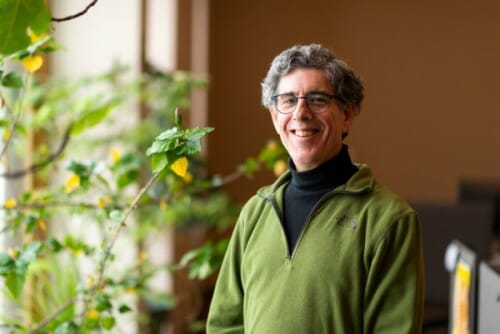Research network to measure and promote emotional well-being
From February through June, we will highlight the ways that UW–Madison powers the state’s economy through research and innovation, educates the next generation and reaches out to Wisconsinites to improve their lives. April’s theme is Innovation. Watch for more at #CantStopABadger and #UWimpact on social media. Your support can help us continue this work.
The University of Wisconsin–Madison has received a $2.5 million four-year grant from the National Institutes of Health (NIH) to establish a research network on the plasticity of well-being and to develop innovative measures of the key pillars of well-being. The network, funded by the National Center for Complementary and Integrative Health, is one of five research networks across the country that NIH is supporting to advance our understanding of emotional well-being.
Faculty and experts from the Center for Healthy Minds are leading the effort, which will include pilot research projects, collaborations and scientific meetings focused on interventions and prevention strategies with partners at UW–Madison, Northwestern University and Massachusetts Institute of Technology (MIT). The goal of the network is to identify ways to measure people’s emotional health and well-being in everyday life and understand how flexible those aspects of well-being could be with effective, culturally relevant interventions and training.
Emotional well-being is, at its core, living a good and meaningful life. One purpose of these networks is to better define emotional well-being and to connect the definition to established research.
Collaborators of the UW–Madison network bring expertise in a broad range of fields, including psychology, neuroscience, microbiology, community-based research, electrical and computer engineering, population health and biology, and the humanities.
“Well-being has been treated as a static variable in science. This network is predicated on the idea that the way we’ve been doing things isn’t the whole story and that well-being is plastic and something we can modify,” says Richard Davidson, principal investigator of the grant, director of the Center for Healthy Minds, and the William James and Vilas Professor of Psychology and Psychiatry at the University of Wisconsin–Madison.
“We’ll be focusing on the core pillars of well-being that exhibit plasticity — what are they, and how can we measure them in ways that are robust and go beyond self report measures? By the end of the four years, we hope to find out and find what strategies work, and to ensure the measures and interventions are applicable to all people and not a specific subgroup.”
Conducting more comprehensive mobile health studies where people can take part at home instead of coming into the lab could not only increase the diversity and number of people in studies, but it could also strengthen the scientific results, especially in the current environment where telehealth and mobile interventions are being accelerated by, and will likely outlast, the pandemic. This is especially true when it comes to gathering samples and data on health and well-being that normally require a visit to the lab, but are now being developed to complete at home.
There are new avenues to understanding well-being that could be explored. For instance, are there clues in blood samples or gut bacteria that correlate with a person’s emotional well-being or with changes from before to after an intervention? How might more passive data collection through wearable technology paint a broader picture about someone’s mental and physical health?
These are some of the questions and exciting angles the network can explore, says Heather Abercrombie, scientific director at the Center for Healthy Minds, who is the scientific coordinator of the network. She says there’s plenty to learn about when it comes to moving one’s skills towards greater emotional well-being and how those skills can be shaped for the better.
“We really need to find a way to measure how skills related to emotional well-being move toward capacities and then competencies, like how we gradually learn a new language or how to ride a bike with practice” she says. “This gets at what we call plasticity — our brains’ and bodies’ ability to change.”
Abercrombie says the shift toward personalized medicine — medical treatment tailored to a specific person — has yet to be explored for emotional well-being and mental health. In addition, exploring how culturally enriched interventions based on a person’s race, cultural and lived experiences can ensure that the research outcomes and tools from the network are equitable and relevant across communities.
UW–Madison contributes $20.8 billion per year to the Wisconsin economy, and UW–Madison related start-ups contribute an additional $10 billion. Read more here.





